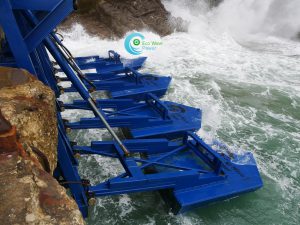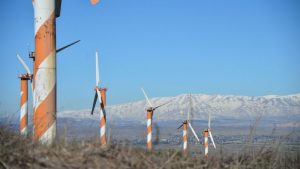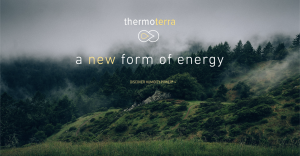Affordable and Clean Energy


SDG 7 -Israel’s Energy Revolution – New Projects and Initiatives-By Dr. Eitan Eliram Lead Innovation Strategist
Israel is in the midst of a revolution. Leading the energy revolution are the Ministry of Environmental Protection and the Keren Kayemet L’Yisrael – Jewish National Fund (KKL-JNF) who are hoping to reduce pollution and environmental hazards, and to improve the quality of life for Israeli citizens.
The revolution began with a resolution, outlined in the document “Israel’s Preparation for Adaptation to Climate Change: Implementation of Government Recommendations for Strategy and National Action Plan”. The resolution was a statement of Israel’s awareness of the changing climate and its impact on water, health, agriculture, energy, biodiversity, economics and geostrategy. Israel stated its intention to implement action plans and take policy measures to reduce health, environmental and economic risks and encourage utilization of opportunities and potential benefits related to climate change. To further this goal the Ministry of Environmental Protection established the Climate Change Preparedness Administration.
Phase one – Clean car revolution
The energy revolution is the clean car revolution, which was launched to reduce air pollution from transportation vehicles. It is estimated that about half of air pollution damage are caused by transportation emissions. Most of the pollution comes from diesel vehicles such as buses, trucks and vans, thus the main effort to reduce pollution is directed at those vehicles. To that end, the Ministry of Environmental Protection is encouraging a shift to hybrid taxis and electric buses, as well as the installation of particle filters on garbage trucks, the introduction of collective electric vehicles to large cities, the reduction of travel to work in private vehicles and a limitation of polluting diesel vehicles in city centers.


Phase two – Green environment
Involves green energy projects, and a green environment, in which housing projects in disadvantaged municipalities receive support leading to energy efficiency, cost savings for residents, neighborhood rehabilitation, and improvement of the community and the neighborhood. As part of the project – named Schunah Tova (“good neighborhood”, in Hebrew) – the authorities chose a sequence of 10 housing structures for rehabilitation and undertook to rehabilitate a public area adjacent to the selected housing projects. Photovoltaic systems were installed on the roofs of the buildings for the production of solar energy (PV). The savings from these systems will be invested in ongoing maintenance. In addition, economical lighting, shading and automatic irrigation systems were installed. It goes without saying that the advantages of these new systems are a win-win, both for the environmental health of the country and for disadvantaged populations in the periphery.
Phase three – Green building in primary schools
The third phase brought Israeli primary schools onboard the revolution, some receiving financial rewards in the national competition for green building. The principles of green building in schools include providing the proper infrastructure for making the school environment healthier by reducing students’ exposure to pollutants from the building, increasing natural light and ventilation, and improving the overall experience of a prolonged stay in the school building. Studies conducted in around the world indicate that in green school’s student achievements are increased and there is a reduction in the number of sick days for teachers and students alike.
Phase four – Reducing Air Pollution
The fourth phase introduced the Energy Minister’s plan and the National Program for Reducing Air Pollution promoted by the Ministry of Environmental Protection under the Clean Air Law. The Israeli Ministers of the Environment and Energy Committee have been leading a joint policy to reduce coal use in recent years to reduce air pollution and greenhouse gas emissions. Under these plans, the goal set for Israel by 2030 is zero coal, the maximum possible amount of renewable energy and the rest by natural gas. As part of the initiative, Israel sent a delegation to the climate conference in Katowice, Poland and joined the PPCA initiative – a global coalition to reduce the use of coal. The coalition supports the reduction of the use of coal in the OECD countries by 2030 and the entire world by 2050.
A significant step that Israel has taken under the initiative has been the decision that units 1-4 of the Orot Rabin power station in Hadera – which constitute one-third of the coal production capacity in Israel- will be closed by June 2022. By 2030 the use of coal will come to a complete halt. Israel has already seen the fruits of its labor which have already led to a 25% reduction in the production of electricity from coal in 2015 and a reduction in emissions of tens of percent.


Phase five – technologies for reducing environmental risks
The Ministry of Environmental Protection and the Innovation Authority have decided to support pilots of technologies to reduce environmental risks, in the amount of NIS 10 million; The total amount of support provided under the plan is NIS 35 million.
The support grants are designed to test the industrial-scale feasibility of technologies that reduce environmental risks, such as and will focus on the following issues: reduction of industrial air pollution, transportation and fires in open areas; prevention and reduction of pollution and hazards from hazardous substances, asbestos and pesticides; optimization of cleaner production processes and manufacturing processes; treatment and cleaning of contaminated environment, such as contaminated water and soil; control and reduction of hazards – noise, vibration, odor; monitoring and control of pollution, the emission source and the environment; development and production of more environmentally friendly products, such as green building; recycling; development of environmental services such as waste management and water resource management; production and storage of clean energy; energy efficiency, and more.
In order to assist companies, achieve commercialization of their technologies, the Ministry of Environmental Protection will support grants in cooperation with the Innovation Authority, as well as a provide regulatory support for the licensing of pilot facilities, which will enable the removal of regulatory barriers in the Ministry.
Phase six – Center for Efficiency in Resources
The establishment of the Center for Efficiency in Resources by the Ministry of Environmental Protection, the Ministry of Economics and Industry and the Ministry of Finance. The purpose of the Center will be to direct environmental investments original solutions for preventing pollution, rather than using the investments to treat pollution after its creation. This will then lead to savings in raw materials, energy and water and ultimately to clean production. The Center that will be established will be a partner in the worldwide network of centers and will be based on the professional knowledge accumulated in the developed countries. The Center’s activity is expected to bring Israeli industry to the forefront of the world’s knowledge of technologies and tools in the field of clean manufacturing, while encouraging and promoting the assimilation of innovative Israeli technologies in the field.
Phase seven – Trade in waste and byproducts in industrial plants
Of final, but not insignificant mention is a national pilot for the promotion of industrial symbiosis designed to promote trade in waste and byproducts in industrial plants. This program will aid the economy by reducing costs of waste treatment and saving raw materials, reducing waste, preventing pollution and reducing resource consumption.
The above mentioned phases of the energy revolution are only the beginning. Ultimately these and other initiatives will jumpstart the Israeli industry to the global front, leading to improved competitiveness of Israeli companies, reduced pollution, and a healthier, cleaner environment.
Related articles


SDG 7 -Riding the Power of the Wave-By Dr. Eitan Eliram Lead Innovation Strategist Aug. 2024
Affordable and Clean Energy Inna Braverman, founder and CEO of Eco Wave Power is one of the rare breeds of female entrepreneurs who took the


SDG 7 -The (Energy) Answer is Blowing in the Wind-By Dr. Eitan Eliram Lead Innovation Strategist Feb 2024
Affordable and Clean Energy Going back just two years, sober reports claimed that less than 3% of Israel’s energy came from renewable sources. But the


SDG 7 -ThermoTerra – A new form of sustainable Energy-By Dr. Eitan Eliram Lead Innovation Strategist
Affordable and Clean Energy The green energy eco-system is familiar with renewable energies such as solar power and wind power, ThermoTerra introduces an entirely new


















